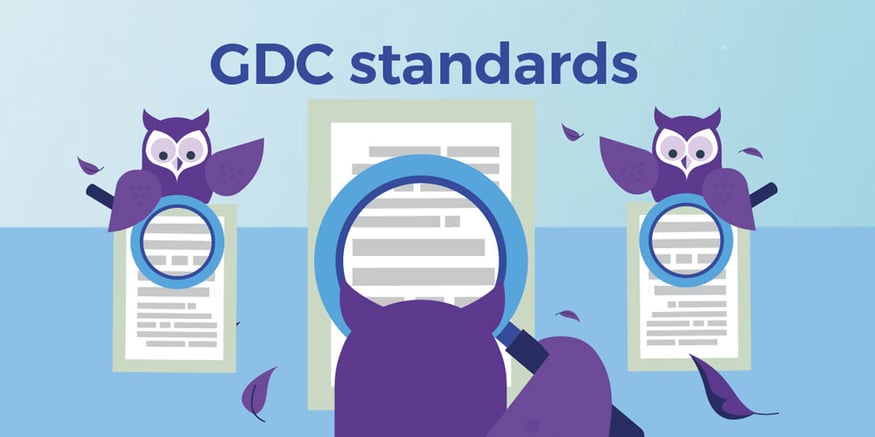HPPB Blog
How many GDC standards are there?
The General Dental Council outlines a number of regulations or ‘standards’ that registered dentists must follow - but just how many GDC standards are there?
The General Dental Council (GDC) investigates the following areas of practice:
(from GDC website)
- serious or repeated mistakes in clinical care, for example mistakes in diagnosis or dental procedure.
- failure to examine a patient properly, to secure a patient’s informed consent before treatment, keep satisfactory records, or to respond reasonably to a patient’s needs
- not having professional indemnity insurance
- cross infection issues (for example, using dirty clinical equipment during treatment)
- serious breaches of a patient’s confidentiality
- indications of a criminal offence including fraud, theft or dishonesty by a dental professional
- poor health or a medical condition that significantly affects a dental professional’s ability to treat patients safely.
If a registrant’s fitness to practise is found to be impaired, the GDC may decide to:
- take no action
- issue a reprimand
- place conditions on registration
- suspend registration
- remove an individual from the register.
Which make up the overarching GDC standards.
GDC standards and experience with our dental clients
We have detected an increasing trend in the number of complaints received by dentists. Typically, patients use a complaint as a bargaining chip to discount fees or secure a wider treatment plan for the same cost.
The trend does not suggest an increase in justified complaints and our clients tell us they can range from the nuisance to the destressing.
In any event, part of our service is to front these cases on your behalf. Our experience is that complaints fall into the following categories:
Dissatisfaction
Here, the range of circumstances is at its widest. Issues range from allegations of rudeness from staff to disappointment with treatment outcomes. It is unusual, but not unheard of, for a threat of a complaint to the GDC to be made.
Self- confessed anxious patients have the highest treatment to complaint ratio. Often difficulty can be avoided by a frank discussion about the circumstances and the careful recording and quantification of the risks and benefits. The dental record must show the stark objectivity of the risks, particularly where a less than optimal outcome is likely.
In cases of dissatisfaction, our objective is to narrow the issues in dispute at the earliest opportunity and work with you on corrective treatment if necessary and thereafter to ensure the complaint does not develop into a claim for compensation.
We make a point of involving you at each decision point. More often than not, the decision as to any particular course of action is a commercial one. It would be naïve to think that social media is not a force in these situations and your reputation is the most important factor in cases in this category. In the vast majority of cases negligence will not be made out and a robust rebuttal (with appropriate explanation) is required. Where commercial reasons make a good will payment appropriate, we advise on a suitable offer. For many clients, judging an appropriate sum is often the most difficult aspect and MRSL draws on its extensive experience and database of previous settlements. We never advise a full refund as this makes no commercial sense, all the more so where the service has been performed non-negligently.
Allegations of Negligence
Here, matters are much more formal. Increasingly patients will be represented by Solicitors (often on a “no win, no fee” basis). A parallel complaint to the GDC is increasingly common. The process will start with a request for dental records (which cannot be denied). The strongest defence at this stage is evidence of a robust consent procedure such that the risks of the Solicitors progressing the case are too great. As you will be aware, if the patient loses the case he will have to pay the costs of both sides. That is the primary risk factor for the lawyers.
A notification to insurers is required as part of the policy conditions and they may well appoint their own Solicitors to act on your behalf.
MRSL Enterprise can deal with the disclosure of notes on your behalf as very often an appraisal of the dental records can deflect a claim from being pursued. Over the last 12 months we have not had a single case where we have disclosed notes develop into a claim.
Conclusions
In summary do not believe it is advisable to feel cowered by a threat of a complaint to the GDC as a lever to secure a refund of treatment costs when a complaint arises without an appraisal of merits. Part of our service is to assist you with that exercise and to front any correspondence for you. In our experience, it is very important to give distance between the patient and the dentist. A complaint or claim is never improved when things get personal.

